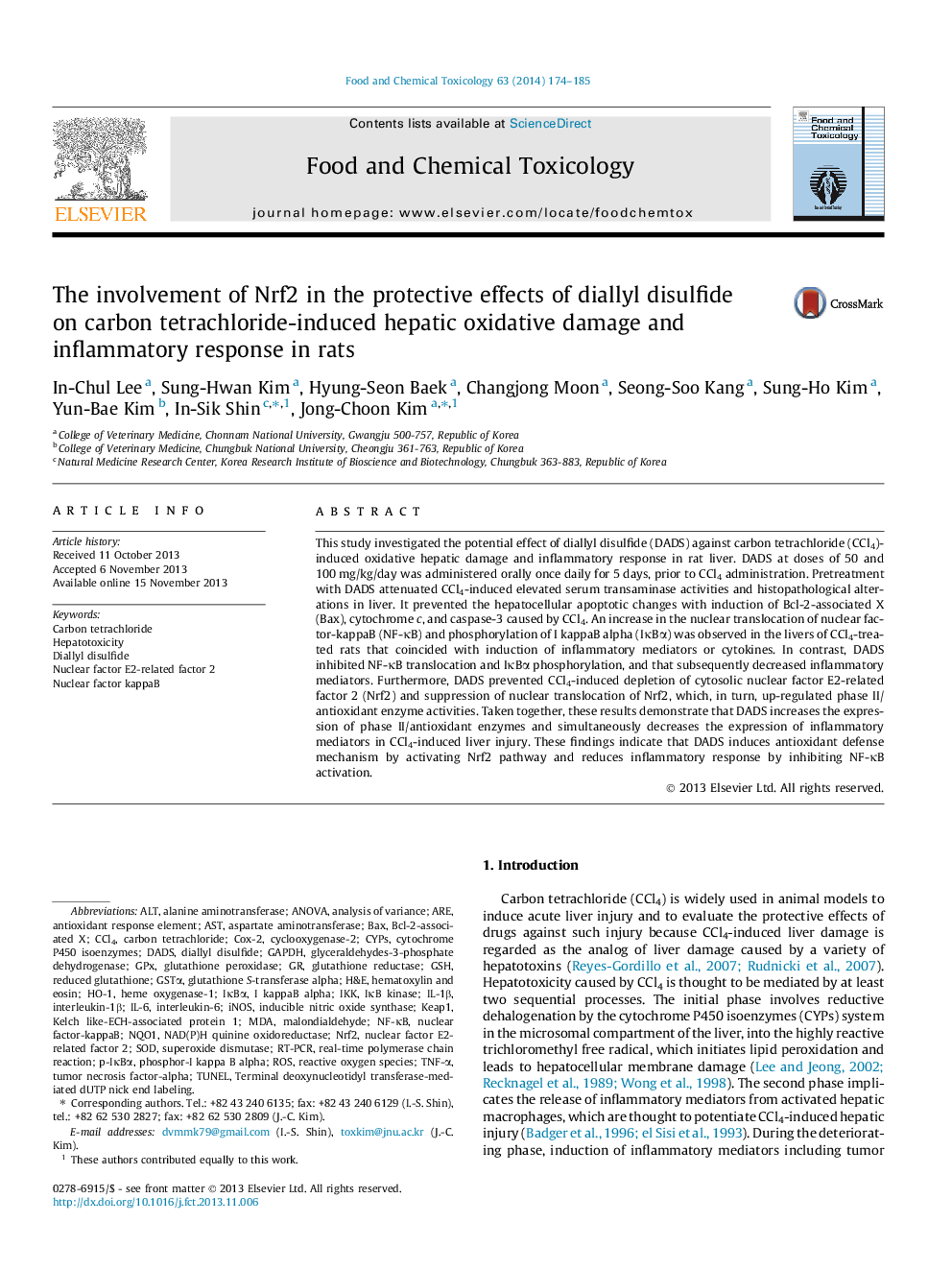| Article ID | Journal | Published Year | Pages | File Type |
|---|---|---|---|---|
| 5850837 | Food and Chemical Toxicology | 2014 | 12 Pages |
Abstract
This study investigated the potential effect of diallyl disulfide (DADS) against carbon tetrachloride (CCl4)-induced oxidative hepatic damage and inflammatory response in rat liver. DADS at doses of 50 and 100 mg/kg/day was administered orally once daily for 5 days, prior to CCl4 administration. Pretreatment with DADS attenuated CCl4-induced elevated serum transaminase activities and histopathological alterations in liver. It prevented the hepatocellular apoptotic changes with induction of Bcl-2-associated X (Bax), cytochrome c, and caspase-3 caused by CCl4. An increase in the nuclear translocation of nuclear factor-kappaB (NF-κB) and phosphorylation of I kappaB alpha (IκBα) was observed in the livers of CCl4-treated rats that coincided with induction of inflammatory mediators or cytokines. In contrast, DADS inhibited NF-κB translocation and IκBα phosphorylation, and that subsequently decreased inflammatory mediators. Furthermore, DADS prevented CCl4-induced depletion of cytosolic nuclear factor E2-related factor 2 (Nrf2) and suppression of nuclear translocation of Nrf2, which, in turn, up-regulated phase II/antioxidant enzyme activities. Taken together, these results demonstrate that DADS increases the expression of phase II/antioxidant enzymes and simultaneously decreases the expression of inflammatory mediators in CCl4-induced liver injury. These findings indicate that DADS induces antioxidant defense mechanism by activating Nrf2 pathway and reduces inflammatory response by inhibiting NF-κB activation.
Keywords
IKKGSHGPXGAPDHHO-1COX-2RT-PCRALTCCl4IL-1βiNOSHeme oxygenase-1IκBαNQO1DADSkelch like-ECH-associated protein 1Bcl-2-associated XCytochrome P450 isoenzymesMDANrf2NF-κBIL-6keap1CYPsH&EIκB kinaseROSASTAspartate aminotransferaseAlanine aminotransferaseinterleukin-6Interleukin-1βBaxanalysis of varianceANOVATerminal deoxynucleotidyl transferase-mediated dUTP nick end labelingtumor necrosis factor-alphaTUNELDiallyl disulfideSODHepatotoxicityinducible nitric oxide synthaseSuperoxide dismutaseCyclooxygenase-2nuclear factor E2-related factor 2antioxidant response elementTNF-αnuclear factor-kappaBnuclear factor kappaBmalondialdehydeAREHematoxylin and Eosinreal-time polymerase chain reactionreduced glutathioneCarbon tetrachlorideglutathione reductaseglutathione peroxidaseglyceraldehydes-3-phosphate dehydrogenaseReactive oxygen species
Related Topics
Life Sciences
Agricultural and Biological Sciences
Food Science
Authors
In-Chul Lee, Sung-Hwan Kim, Hyung-Seon Baek, Changjong Moon, Seong-Soo Kang, Sung-Ho Kim, Yun-Bae Kim, In-Sik Shin, Jong-Choon Kim,
